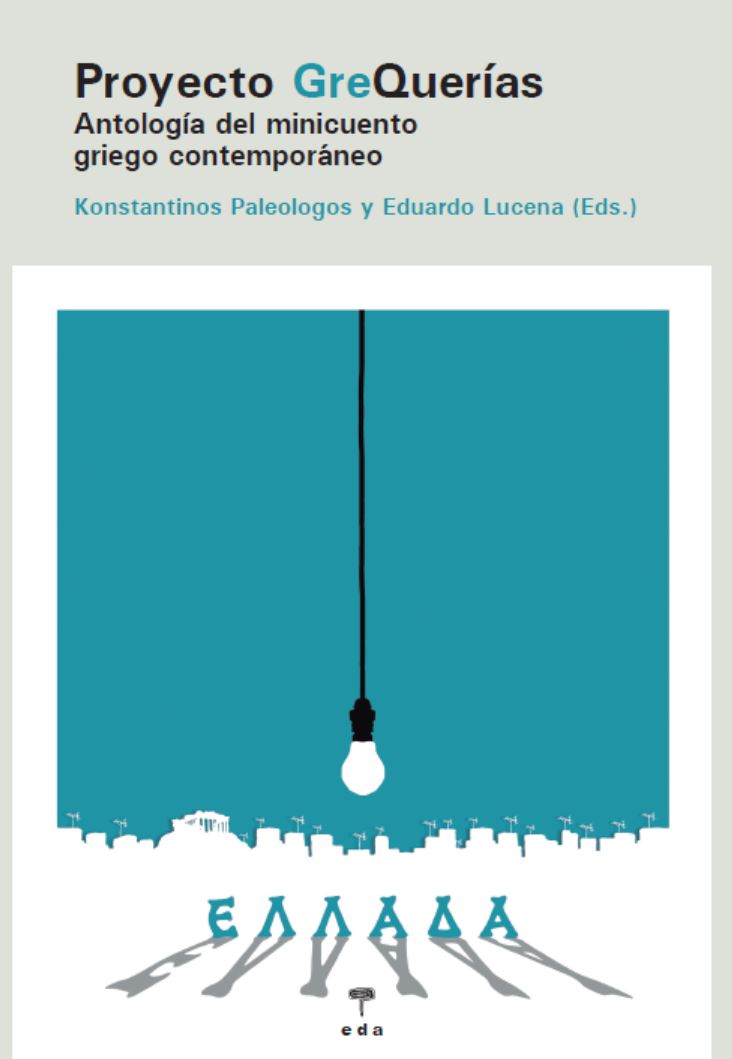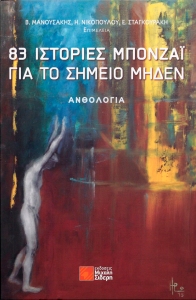Vangelis Raptopoulos
In Pieces
 HE MOVIE was at its climax. On the white screen images followed one right after the other. The takes fell in succession, with a quick rhythm, breathlessly. I could see his leg tied to the rails, the train coming at full speed, spewing forth smoke, his face sweaty, again the foot, and later a wide-angle shot from above. In the midst of the general silence, along with the stir the oncoming train made, I could hear an empty bottle rolling down the aisle. The audience held its breath. I squeezed the arm of my seat hard. His agony was transfused into me. It was at that moment, I made up my mind and entered his body. I gave him my voice and began to think me instead of him. Thus, I suddenly found myself on the screen, with one of my legs tied to the_ rails. Down in the main floor seats and high up in the balcony, I saw the audience gaping. In the thick darkness, I could single out scattered sparks — the embers of those who were smoking secretly, holding their cigarettes low in the palms of their hands. I felt all alone. The train was rapidly coming towards me, without the engineer knowing that I was there. I moved my foot continually up-down, right-left, but it wouldn’t come loose. I was seized with despair. Not a soul was around. True, I didn’t have a meeting with anyone. I’d gotten into a fight with Sophoula, and Odysseus had something to do – I’d been alone and went to a movie to pass the time and here I am with my right foot, hooked on the track and the unchecked train opposite me.
HE MOVIE was at its climax. On the white screen images followed one right after the other. The takes fell in succession, with a quick rhythm, breathlessly. I could see his leg tied to the rails, the train coming at full speed, spewing forth smoke, his face sweaty, again the foot, and later a wide-angle shot from above. In the midst of the general silence, along with the stir the oncoming train made, I could hear an empty bottle rolling down the aisle. The audience held its breath. I squeezed the arm of my seat hard. His agony was transfused into me. It was at that moment, I made up my mind and entered his body. I gave him my voice and began to think me instead of him. Thus, I suddenly found myself on the screen, with one of my legs tied to the_ rails. Down in the main floor seats and high up in the balcony, I saw the audience gaping. In the thick darkness, I could single out scattered sparks — the embers of those who were smoking secretly, holding their cigarettes low in the palms of their hands. I felt all alone. The train was rapidly coming towards me, without the engineer knowing that I was there. I moved my foot continually up-down, right-left, but it wouldn’t come loose. I was seized with despair. Not a soul was around. True, I didn’t have a meeting with anyone. I’d gotten into a fight with Sophoula, and Odysseus had something to do – I’d been alone and went to a movie to pass the time and here I am with my right foot, hooked on the track and the unchecked train opposite me.
In a moment I saw the elbow of the engineer outside the first car. I imagined that, he was smoking with his other hand and immediately I became upset’that at such a serious moment I attached importance to such trivia. Then I told myself to count how much time was left before the train runs me over and suddenly I remembered that in similar circumstances there is always a camera crew shooting the film, thereby proving how everything is a trick, a lie. Around me, though, there was nothing. I was disillusioned. What had come over me suddenly to take his place and get my leg tied to the rail? I thought I’d cut it off in order to get away, but afterwards I could die of a hemorrhage. Which spectator would give me blood if the lights were turned on? I began to swear. The train had definitely drawn closer. I cried. Heavy drops leapt out of my eyes and began to run down my face. I cried without sobbing, silently, dumbly. Then, a few minutes before the inevitable occurred, it came to me that I should take an expression analogous to the moment because suddenly, I said, the director could appear and say, on top of that, that I destroyed the scene. I broke into a wide grin but changed it immediately, because I understood that it wasn’t the right thing for the moment. Then I stretched my arms high as if begging and let out a heart-rending shout. The engineer pulled his arm inside. The train spit out two puffs of smoke. I knew it was the end. I turned towards the audience and, with all my strength, made a gesture against them till my fingers hurt. I began to spit on them and gestured without stopping. The train ran shrilly over my foot. I heard a confused and hair-raising noise. Then I broke below and my legs turned to pulp. Like a piece of string, which is coiled, braided, and doubled over, my whole body was twisted, got lost in the tracks, and was promptly swallowed up. I became an amorphous mass of meat, bones, fat, and fabric. But, I didn’t feel any pain at all. The spectators were looking confounded. In a little while the whole train passed completely and was lost in the distance, leaving behind some dark purple puffs of smoke. My remains upon the tracks could feel the vibrations dying away as the train went far off. A little time passed with nothing happening. I don’t exactly know what the screen showed that minute, because I found myself at ground level, in pieces, and couldn’t see very well. I began to get bored with this predicament of dismemberment. Perhaps, I also felt perplexed. Then, my gang came along the tracks and the jokes began. They acted as if they didn’t see me and I became upset at their attitude. Then Manos said, “The poor guy got cut to pieces,” and they all became quiet. A guilty silence prevailed. “Cut out the funny stuff, you guys,” I myself told them and they found it strange I was talking. Especially Sophoula, even though we’d broken up and she’d deserted me for Manos, bent over the rails, dropping his huge hand; her glance was diffused because she didn’t know where to look at me. She said, “I want you even if you are stained with blood, I want you, you know that,” her eyes playing among the flesh, the blood, the clothes, the broken bones and I saw that she was crying and tears were falling on me, without me knowing exactly on which point of my body, because the flesh was all mixed up — pieces from the hands with skin from the feet, all mixed up like Russian salad. Finally, I got upset that they’d all come like grief-stricken relatives, with their melodramatic sentiments and their moans and I insulted them. “Get lost,” I said. “I don’t wanna see you, get the hell out of here,” and they were struck dumb. Only Stamatis struck a pose and said, “We’re gonna stay here. Are you gonna, tell us what to do?” and he sat provocatively on the ground, a little over there. “Is this spot yours?” he yelled at :me and I felt weak like this, in pieces, without a concrete body, I was sorry ‘ I couldn’t face them, but I found the strength to answer him, “Hey, it’s mine. My grave! Do you mind?” And, he, too, shut up. After a little while —luckily, that is— Odysseus came, yelled at them, and threw them out. I was thankful because I’d begun to get bored with the situation. Afterwards, I got up, reassembled myself, came down off the screen —I was a little hungry as if they’d drawn my blood— and left the theater. Outside it was chilly. I buttoned up and lit a cigarette. In my mouth I had a bitter taste. I blew out the smoke, as I’d seen the engine do a little while before…
Vangelis Raptopoulos (Athens, 1959). He studied education and journalism. From 1980 to 1981 he lived in Sweden, and in 1984 spent a half-year in the United States on an International Writing Program scholarship. His first work, published at age 20, In pieces (1979), was enthusiastically received; excerpts were translated into English, French, German and Swedish. His next two novels, Toll Gates (1982) and The Cicadas (1985) ― with which he completes a trilogy-team portrait of his generation, during its adolescence ―, established him as one of Greece’s most promising young authors. (The trilogy was published in one volume, under the general title: My Generation in 2003.)
Translated from the Greek by
Anna Lillios is an Associate Professor of English at the University of Central Florida. She is the author of Crossing the Creek: The Literary Friendship of Zora Neale Hurston and Marjorie Kinnan Rawlings, which will be published in summer 2010 by the University Press of Florida. She edited the collection Lawrence Durrell and the Greek World. She is the editor of Deus Loci: The Lawrence Durrell Journal, the co-editor of the Marjorie Kinnan Rawlings Journal of Florida Literature, and a coeditor of the Zora Neale Hurston Electronic Archive. She is the executive director and trustee of the Marjorie Kinnan Rawlings Society. She received the 2008 Distinguished Colleague award from the Florida College English Association.
Filed under: Raptopoulos Vangelis | Tagged: Anna Lillios,Vangelis Raptopoulos |









